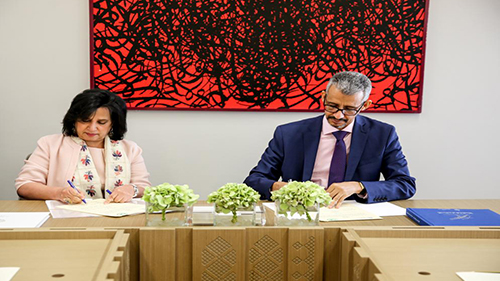Contact Center
.
05 November 2019
Memorandum of Understanding Between ALECSO and ARC_WH, Enhancing Natural and Cultural Heritage Protection in the Arab World


H.E Shaikha Mai Al Khalifa, ARCWH's Chairperson signed, on 5 November 2019, a Memorandum of Understanding(MoU) with the director of the Arab League Educational, Cultural and Scientific Organization (ALECSO), the new Director General, Dr. Mohamed Ould Amar, in the presence of Dr. Shadia Touqan, Director of the Arab Regional Centre for World Heritage (ARC-WH), Dr. Lobna Khalifa Suleibikh, Secretary-General of The National Committee for Education, Science and Culture.
The signed MoU between ALECSO and ARC_WH stresses the importance of protecting the cultural heritage in the Arab world in all its forms and aspects, especially the tangible heritage.in addition, the MoU anchors a basic principle of greater cooperation between both parties with regard to the preservation and safeguard of World Heritage sites in the Arab countries through supporting Arab countries to implement the 1972 World Heritage Convention. Cultural heritage is the outcome of human experiences within a dynamic social context. Its tangible and intangible aspects are among the most fundamental sources of social solidarity, world views, beliefs, practices, and aspirations. Arab heritage, one of the main strands of world heritage, is rich and diverse, representing, with all its myriad manifestations, a cultural capital that can be mobilized, at a time of radical political and economic changes in the region and the world as a whole, as a means of enhancing prosperity, the MoU confirms. Indeed, regional activities and plans, technical and material support would enhance the cultural assets in Arab societies, shedding light on major Arab contributions in world civilizations in the region. The MoU stipulates that common different activities, meetings, workshops, training sessions, providing technical support to Arab countries, shared programs in many fields should be carried out in cooperation with ALESCO in order to enhance awareness about the World Heritage List of Arab natural and cultural heritage sites’ issues and topics, sites that have an outstanding value as per the regulations of the World Heritage Convention.
With regard to capacity building strategy, it is argued that the Arab States Region, like all other regions of the world, will need to enhance and promote the development of such expertise in order to better identify, protect, and manage cultural and or natural World Heritage sites. Accordingly, as part of its new strategy to invest in human resources for the protection of World Heritage Sites in the region, the Arab Regional Centre for World Heritage (ARC-WH) and ALECSO will organize and implement, a Capacity Building program for World Heritage Professionals in the Arab Region. This programme aims to build a strong network of experts from the Arab Region that will assist the Arab States, the Advisory Bodies, and all World Heritage stakeholders in the effective implementation of the World Heritage Convention.
The MoU awareness spreading about the World Heritage Convention opens the door for active cooperation between the two sides in education, raising and spreading awareness about the importance of cultural heritage in local communities, especially with regard to UNESCO World Heritage List sites in the Arab region. Promotion of IHC implementation mechanisms and safe transfer to future generations, helping with the translation of publications by World Heritage Center and Advisory Committees into Arabic, including the guiding principles of IHC implementation, subject-oriented studies and other regional or international practical research studies are also among the objectives of this MoU.
ARC-WH and ALECSO’s expected impact of this memo program is a vibrant collaboration between governmental and non-governmental institutions and communities in both countries to ensure that the latter can sustainably recreate and transmit their ICH to the next generation, while respecting the principles of the Convention. It is therefore important and urgent to call for a formal recognition of cultural heritage management in the Arab World and to engage authorities, the business community, intellectuals, educators, policy makers, the media and scholars in developing a vision of how to mobilize cultural heritage in economic and political developments in the region.It will strengthen the place of intangible cultural heritage in sustainable development ranging from security, social cohesion and the search for relevant and quality education to food security, environmental concerns and health matters. Its long-term legacy will be institutions and particularly communities that have the capacity to safeguard and enjoy intangible cultural heritage effectively, thereby promoting mutual respect and appreciation, bringing human beings closer together and ensuring exchange and understanding among them
Worth to mention that the Arab League Educational, Cultural and Scientific Organization (ALECSO) is a Tunis-based institution of the Arab League, established in accordance with article 3 of the Arab Cultural Unity Charter by an announcement made in Cairo, Egypt, on 25 July 1970. ALECSO works to coordinate cultural and educational activities in the Arab world. Among its various activities, subsidiary ALECSO institutions have been established across the Arab world. The ARC-WH is a category 2 centre under the auspices of UNESC, as stipulated in an agreement signed between the Government of Bahrain and UNESCO on 5 February 2010, to be based in Manama, Bahrain. the ARC-WH is established to support the implementation of the 1972 World Heritage Convention in the Arab States region with the underlying aim of protecting, conserving and presenting cultural and natural heritage. Today the ARC-WH helps in capacity building skills for world heritage sites’ managers, spread and raise awareness about world heritage, and contribute in safeguard and protection of 84 mixed natural and cultural world heritage sites in the most of the Arab countries.







